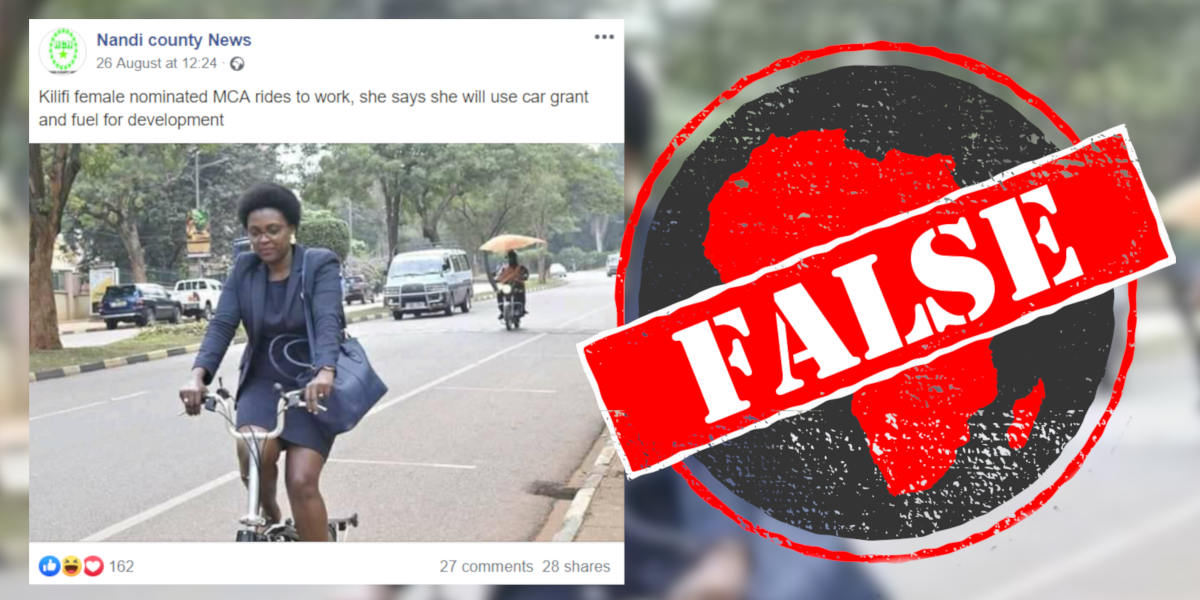A Facebook page shared a photo of a smartly dressed woman riding a bicycle, claiming it showed an unnamed member of the county assembly (MCA) from Kilifi, a coastal county north of Mombasa, Kenya.
“Kilifi female nominated MCA rides to work, she says she will use car grant and fuel for development,” said the caption without identifying her.

However, there are some clues that the photo isn’t of a Kenyan politician.
The woman in the photo does not resemble any of the women in the Kilifi county assembly’s website.
A closer look shows that the vehicle behind the woman shows a registration plate that does not resemble the system used in Kenya.
A reverse image search shows that the image is of Amanda Ngabirano, an assistant lecturer at Makerere University College of Engineering, Design, Art and Technology in Kampala, Uganda
She uploaded the image on 23 August 2019 on her personal Twitter account with the tweet: “Hello Kampala, this is how I beat today's traffic. It's easy to grab the bike, the bag and enjoy the freedom of cycling whenever you feel like.” Her Twitter account makes clear she is a bike enthusiast.
The same photo was reposted by the Makerere University Twitter account, saying: “Makerere’s response to the global SDGs [sustainable development goals] has been shaped by our diverse approach, from the lecture theatre to getting involved. Ms. Amanda Ngabirano… rides her bicycle in Kampala.”
The university tweeted again to say that Ngabirano has been pushing for safe cycling infrastructure for Kampala and other African cities since 2010.
The female cyclist was on the road in Kampala, Uganda, not Kilifi, Kenya. – Dancan Bwire
“Kilifi female nominated MCA rides to work, she says she will use car grant and fuel for development,” said the caption without identifying her.

Clues photo not from Kilifi or even Kenya
However, there are some clues that the photo isn’t of a Kenyan politician.
The woman in the photo does not resemble any of the women in the Kilifi county assembly’s website.
A closer look shows that the vehicle behind the woman shows a registration plate that does not resemble the system used in Kenya.
Assistant lecturer on way to Kampala
A reverse image search shows that the image is of Amanda Ngabirano, an assistant lecturer at Makerere University College of Engineering, Design, Art and Technology in Kampala, Uganda
She uploaded the image on 23 August 2019 on her personal Twitter account with the tweet: “Hello Kampala, this is how I beat today's traffic. It's easy to grab the bike, the bag and enjoy the freedom of cycling whenever you feel like.” Her Twitter account makes clear she is a bike enthusiast.
The same photo was reposted by the Makerere University Twitter account, saying: “Makerere’s response to the global SDGs [sustainable development goals] has been shaped by our diverse approach, from the lecture theatre to getting involved. Ms. Amanda Ngabirano… rides her bicycle in Kampala.”
The university tweeted again to say that Ngabirano has been pushing for safe cycling infrastructure for Kampala and other African cities since 2010.
The female cyclist was on the road in Kampala, Uganda, not Kilifi, Kenya. – Dancan Bwire
Republish our content for free
For publishers: what to do if your post is rated false
A fact-checker has rated your Facebook or Instagram post as “false”, “altered”, “partly false” or “missing context”. This could have serious consequences. What do you do?
Click on our guide for the steps you should follow.
Publishers guideAfrica Check teams up with Facebook
Africa Check is a partner in Meta's third-party fact-checking programme to help stop the spread of false information on social media.
The content we rate as “false” will be downgraded on Facebook and Instagram. This means fewer people will see it.
You can also help identify false information on Facebook. This guide explains how.


Add new comment